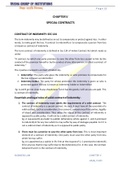Class notes
buisness law
- Course
- 46466969
- Institution
- Canadian Coast Guard College (CCGC )
Business law is a crucial component of law in general since, without it, the corporate, manufacturing, and retail sectors would all be under a dictator’s rule. Combining business and law seeks to create secure and efficient working environments for everyone associated with the business. You m...
[Show more]



